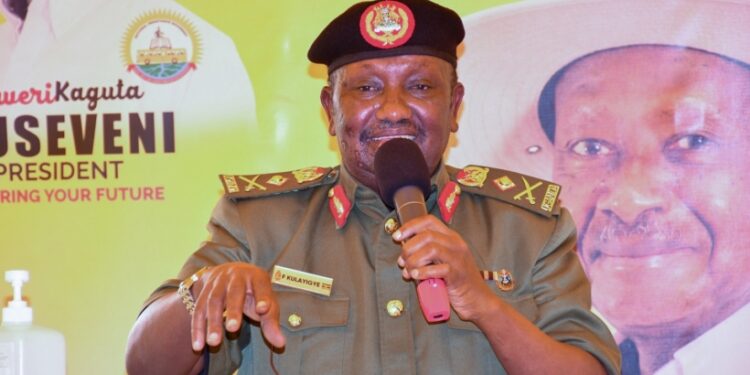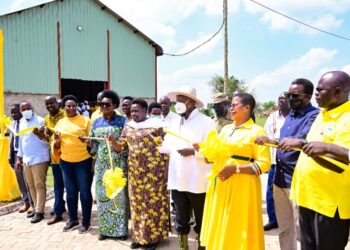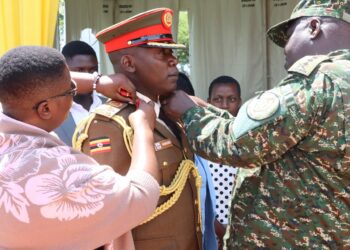The Uganda People’s Defence Forces (UPDF) Spokesperson Brig. Gen. Felix Kulayigye has said the army has built a strong relationship with the citizens which has enabled the force to maintain stability in the country.
He said that the UPDF has managed to bond so well and work with civilians to create an environment that enables everyone to prosper through the peace created.
Kulayigye was on Thursday afternoon delivering a lecture on “The NRM and the UPDF: Civil-Military Cooperation, an imperative of the NRA/M journey” in weekly NRM ideological clinics at the party headquarters in Kampala.
He said that NRM came to power through a revolution and people played a very big role to enable the NRA succeed.
“The army can’t exist without people. That’s why only 27 armed people could stage a revolution and take up a well-equipped national army because they had the support of the people. They were ideologically convinced,” Kulayigye said.
The former Chief Political Commissar of the UPDF also said that the protracted people’s struggle that the NRA/M fought between 1981 to 1986 was successful because they had to first convince people to get convicted.
“That’s why NRM had to ideologically first orient people to understand its objectives,” he said, adding that, “People were taught patriotism, pan-Africanism, socio-economic transformation and democracy. The ten-point programme of NRA/M were premised on these ideological principles.”
The army legislator also avers that the military itself has ideologically been trained to have ideological conviction which has enabled it to serve the population.
He stressed that “The civil military relations is simply built on the principle that we are because you are. The army has to be pro-people because even those in uniform were once civilians.”
Kulayigye gave an example of the previous governments which had military but they could not sustain power due to poor civil-military relationships.
“One of the weaknesses of the past armies was poor character of individuals. We have to insist on good characters. Amin and Obote all had military but they weren’t ideologically trained. But this government has stood for this long because the army know its objectives. The NRM and NRA journeys are related. The former was produced by the latter. That’s why there’s a strong military state relationship. Correct military line was the first objective and then correct political line,” he said.
“The inculcation of the patriotism values in the army has driven them to love their country,” he said, “These army men can sacrifice for their country and defend it. Even when we go outside country we go on defensive policy. UPDF can’t attack anyone. Look at Alshabbab and ADF terrorist organisations.” Kulayigye affirms.
He therefore asserts that the symbiotic relationship between the army and civilians is inevitable if the NRM wants to sustain power. “The whole essence of peace is to enable people think and innovate. The security is guaranteed but take advantage of it,” he advised Ugandans.
“The military is the strongest pillar of the state, however it is not allowed to directly get involved in politics. A country that forgets its history is lost. The army has to believe and work with a civilian president. That’s civil military relations,” Kulayigye said.
Richard Todwong, the NRM party Secretary General said that given the fact that the NRM was born out of NRA, the role of the military should be appreciated.
“Peace and security that NRM government enjoys is because of the UPDF. Historically we know that the army is only meant for battles and wars, but now they are out of the barracks to provide services to the civilians. They are engineers, teachers and doctors in hospitals,” Todwong said.
“The army has reduced poverty among people through running the Operation Wealth Creation. Now the poverty levels have reduced dramatically in seven years,” he adds.
“By 1986, he said, “The civil service was dead because the previous governments didn’t want educated people in the country. The economy is now doing well, the GDP has increased and so is the revenue,” he informed.
This week’s topic came ahead of 6th February Tarehe Sita celebrations which commemorates the date NRA attacked Kabamba army barracks, sparking the war against Obote’s government in 1981.
Do you have a story in your community or an opinion to share with us: Email us at editorial@watchdoguganda.com













